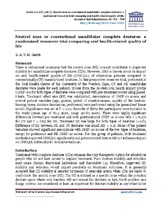Neutral zone or conventional mandibular complete dentures: a randomised crossover trial comparing oral health-related quality of life
Abstract
There is widespread consensus that the neutral zone (NZ) concept contributes to improved stability for mandibular complete dentures (CDs). However, little is known about its impact on oral health-related quality of life (OHRQoL) of edentulous patients compared to conventionally (CV) manufactured dentures. In this prospective crossover trial, performed at the Oral Health Centre of the University of the Western Cape, CV and NZ mandibular dentures were made for each patient. Scores from the 20-item oral health impact profile (OHIP-20) for both types of dentures were compared with pre-treatment scores using paired t-tests. Treatment effect size (ES) was established. Associations of OHIP-20 scores and several patient variables (age, gender, period of edentulousness, quality of the denture-bearing tissue, denture dimensions, reference) were performed using the generalised linear model. Significance was set at P = 0 05. Records of thirty-five participants were included in the study (mean age of 62 3 years, range 47–85 years). There were highly significant differences between pre-treatment and both posttreatment OHIP-20 scores with t = 6 470 for CV and t = 6 713 for NZ. Treatment ES was large for both types of dentures (>0 8). difference of ES between NZ and CV dentures was small (ES < 0 2). None of the patient variables showed significant associations with OHIP-20 scores of the two types of dentures, except for preference and NZ OHIP-20 scores. For this group of patients, both treatment methods improved OHRQoL significantly and patientrelated factors did not influence impact on OHRQoL differently for both interventions.

